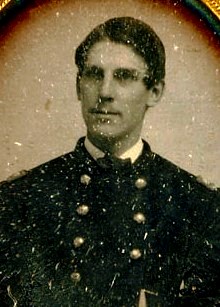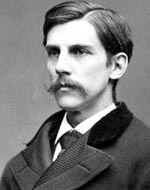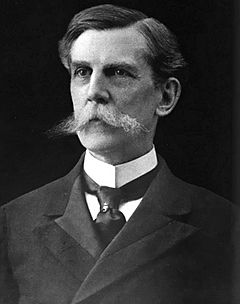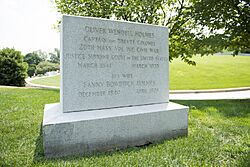Oliver Wendell Holmes Jr. facts for kids
Quick facts for kids
Oliver Wendell Holmes Jr.
|
|
|---|---|
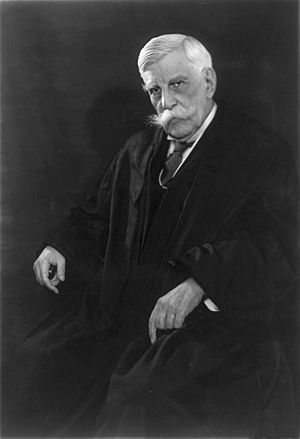
Justice Holmes c. 1930
|
|
| Associate Justice of the Supreme Court of the United States | |
| In office December 8, 1902 – January 12, 1932 |
|
| Nominated by | Theodore Roosevelt |
| Preceded by | Horace Gray |
| Succeeded by | Benjamin N. Cardozo |
| Chief Justice of the Massachusetts Supreme Judicial Court | |
| In office August 2, 1899 – December 4, 1902 |
|
| Nominated by | Murray Crane |
| Preceded by | Walbridge Field |
| Succeeded by | Marcus Knowlton |
| Associate Justice of the Massachusetts Supreme Judicial Court | |
| In office December 15, 1882 – August 2, 1899 |
|
| Nominated by | John Long |
| Preceded by | Otis Lord |
| Succeeded by | William Loring |
| Personal details | |
| Born | March 8, 1841 Boston, Massachusetts, U.S. |
| Died | March 6, 1935 (aged 93) Washington, D.C., U.S. |
| Political party | Republican |
| Spouse |
Fanny Bowditch Dixwell
(m. 1873; died 1929) |
| Parents |
|
| Relatives | Edward Jackson Holmes (brother) Amelia Jackson Holmes (sister) Judge Charles Jackson (grandfather) Abiel Holmes (grandfather) Jonathan Jackson (great-grandfather) Edward J. Holmes (nephew) |
| Education | Harvard University (AB, LLB) |
| Signature | |
| Military service | |
| Allegiance | United States |
| Branch/service | United States Army |
| Years of service | 1861–1865 |
| Rank | Brevet Colonel |
| Unit | 20th Massachusetts Volunteer Infantry |
| Battles/wars | |
Oliver Wendell Holmes Jr. (March 8, 1841 – March 6, 1935) was an important American judge. He served as an Associate Justice on the U.S. Supreme Court from 1902 to 1932. He is known for his many years on the Court and his clear, powerful opinions.
Holmes was especially famous for his ideas on civil liberties and how the government should work. He believed that elected lawmakers should have a lot of power to make decisions. He retired from the Supreme Court at 90 years old, making him the oldest justice to serve there.
Before joining the Supreme Court, Holmes was a soldier in the American Civil War. He was wounded three times during the war. Later, he became a judge and then Chief Justice of the Massachusetts Supreme Judicial Court. He also taught law at Harvard Law School. His unique ideas and writing style made him very popular, especially with people who wanted to see social and political changes in America.
As a Supreme Court Justice, President Theodore Roosevelt appointed him in 1902. Holmes supported states making their own rules about business. He also became a strong supporter of freedom of speech under the First Amendment. In a famous case, Schenck v. United States (1919), he said that free speech does not protect someone "falsely shouting fire in a theatre and causing a panic." He also created the "clear and present danger" test for free speech.
Later that same year, in a different case, Abrams v. United States (1919), he wrote that the best way to find truth is to let ideas compete freely. He said, "It is an experiment, as all life is an experiment." He also warned that we should always be careful about stopping people from sharing ideas we don't like. Holmes was a respected legal scholar. He believed that law was based on real-world experience, not just strict logic. His ideas greatly influenced American legal thinking for many years.
Contents
Growing Up in Boston
Holmes was born in Boston, Massachusetts. His father, Oliver Wendell Holmes Sr., was a famous writer and doctor. His mother, Amelia Lee Jackson Holmes, came from important families. Both his parents were of English background. Their ancestors came to North America from England a long time ago.
His mother was against slavery. His father was a well-known person in Boston's intellectual groups. Famous thinkers like Ralph Waldo Emerson were friends of the family. As a child, Holmes was called "Wendell." He became good friends with the brothers William James and Henry James Jr. He grew up surrounded by smart people and wanted to be a writer like Emerson. He enjoyed writing poetry his whole life.
While at Harvard College, he wrote essays about philosophy. He even asked Emerson to read his ideas against Plato's philosophy. Emerson famously told him, "If you strike at a king, you must kill him." Holmes supported the movement to end slavery. He graduated from Harvard in 1861. When the Civil War began, he joined the Massachusetts militia.
Serving in the Civil War
During his last year of college, at the start of the American Civil War, Holmes joined the Massachusetts militia. In July 1861, he became a second lieutenant in the Twentieth Regiment of Massachusetts Volunteer Infantry. He fought in many battles. These included the Peninsula Campaign and the Battle of the Wilderness.
He was wounded three times: at the Battle of Ball's Bluff, Antietam, and Chancellorsville. He also got very sick with dysentery. Holmes became a lieutenant colonel. In September 1863, while recovering from his third injury, he was promoted to colonel.
In January 1864, Holmes became an aide to General Horatio Wright. He served with Wright during General Grant's campaign. On July 17, 1864, Holmes finished his service. He then returned to Boston and started studying at Harvard Law School.
Becoming a Lawyer and Judge
In the summer of 1864, Holmes went back home to Boston. He wrote poetry and discussed philosophy with his friend William James. In the fall, he enrolled in Harvard Law School. He later said his father "kicked him into the law." He studied there for one year and then worked in his cousin's law office.
In 1866, he earned his law degree from Harvard. He was allowed to practice law in Massachusetts. After a trip to London, he started working as a lawyer in Boston. In 1872, he married Fanny Bowditch Dixwell, a friend from childhood. They were married until her death in 1929. They did not have children of their own but raised an orphaned cousin, Dorothy Upham.
Holmes worked as a lawyer in Boston for fifteen years. During this time, he did important scholarly work. He helped edit the American Law Review. He also prepared a new edition of Kent's Commentaries, a book of legal cases. He put his knowledge into a series of lectures, which became the book The Common Law in 1881.
The Common Law Book
The Common Law has been printed continuously since 1881. It is still an important book about law. In this book, Holmes shared his ideas about how law works. He famously wrote:
The life of the law has not been logic: it has been experience.
He meant that laws are not just based on perfect logic. They are shaped by what people need at the time. They are also influenced by common ideas, politics, and even the feelings of judges. The law shows how a nation has grown over many centuries. It is not like a math book with simple rules.
Holmes believed that the only real source of law was what judges decided. Judges would make decisions based on the facts of a case. Then, they would write down reasons for their decisions. He thought that judges often made choices based on unspoken ideas. These ideas sometimes came from outside the law itself.
He also believed that the common law changes as society changes. Judges share the common ideas of their time. These ideas made Holmes popular with later legal thinkers.
Becoming a State Judge
In 1882, Holmes became a professor at Harvard Law School. But just a few weeks later, he was asked to become a judge on the Supreme Judicial Court of Massachusetts. He quickly accepted and took the oath of office on December 15, 1882. His quick departure from Harvard upset some of the law school faculty.
On August 2, 1899, Holmes became the chief justice of the Massachusetts Supreme Judicial Court. During his time as a judge in Massachusetts, he continued to develop his legal ideas. He usually followed past legal decisions. He also supported workers' rights to form trade unions and to strike. He believed workers should be able to join together to compete fairly with employers.
He famously said in one case that a policeman "may have a constitutional right to talk politics, but he has no constitutional right to be a policeman." This meant that while people have rights, certain jobs might have rules about what you can do. He also wrote that law is about predicting what courts will do. He said, "The prophecies of what the courts will do in fact, and nothing more pretentious, are what I mean by law."
Serving on the Supreme Court
In July 1902, Justice Horace Gray died. President Theodore Roosevelt wanted to appoint Holmes to the Supreme Court. Roosevelt wanted someone from Massachusetts. Senator Henry Cabot Lodge supported Holmes. However, Senator George Frisbie Hoar was against it. Hoar was worried about how the Court would rule on new territories like Puerto Rico.
Despite Hoar's concerns, Roosevelt nominated Holmes. On December 4, 1902, the United States Senate approved him. He officially started his job on December 8.
On the Court, Holmes supported the government's actions in new territories. But he later disagreed with Roosevelt in a big case about business monopolies. This disagreement hurt his friendship with Roosevelt.
Holmes was known for his short, memorable opinions. In his 29 years on the Supreme Court, he wrote many opinions. He ruled on cases about many different federal laws. He is remembered for his smart ideas on topics like copyright law and free speech. Holmes believed that the Bill of Rights protected rights that had developed over many years in English and American law. He is considered one of the greatest judges in American history.
For a short time in 1930, Holmes even acted as the Chief Justice. He led the court sessions until a new Chief Justice was appointed.
Important Supreme Court Cases
Otis v. Parker
In his first opinion for the Court, Otis v. Parker (1903), Holmes showed his belief in letting lawmakers make decisions. He did this even more famously two years later in Lochner v. New York. In Otis v. Parker, the Court supported a California law. This law said that certain stock market contracts were not valid.
Holmes wrote that courts should not stop laws just because judges disagree with them. He said that lawmakers should have "considerable latitude" to make laws. Courts should only step in if a law clearly violates basic rights.
Lochner v. New York
In Lochner v. New York (1905), Holmes wrote a famous dissenting opinion. He supported the idea of lawmakers making decisions, not because he felt sorry for workers, but because he believed in letting elected bodies govern. In this case, the Court struck down a New York law. This law said bakers could not work more than sixty hours a week.
The Court's majority said the law interfered with the right of employers and employees to make contracts. They said this right was part of the "liberty" protected by the Fourteenth Amendment. Holmes disagreed. He said the majority was basing its decision on a certain economic idea, not on the Constitution itself. He wrote that the Fourteenth Amendment "does not enact Mr. Herbert Spencer's Social Statics" (a book about laissez faire economics).
Schenck v. United States
During World War I, there were laws like the Espionage Act of 1917 and the Sedition Act of 1918. These laws made it a crime to criticize the government or the war effort. Holmes wrote three unanimous opinions for the Supreme Court about these laws.
In Schenck v. United States (1919), Holmes wrote for the Court. He said that free speech could be limited if it created a "clear and present danger." This meant if the words used could cause harm that the law was trying to prevent. He famously said that the First Amendment would not protect someone "falsely shouting fire in a theatre and causing a panic."
Abrams v. United States
Later in 1919, in Abrams v. United States, Holmes disagreed with the Court's majority. This case involved people who were against the U.S. getting involved in the Russian Civil War. They were charged with breaking the Sedition Act for distributing leaflets.
The Court's majority upheld their convictions. But Holmes dissented. He argued that the leaflets did not truly threaten to cause harm. He wrote about the importance of free thought in a democracy:
[T]he best test of truth is the power of the thought to get itself accepted in the competition of the market, and that truth is the only ground upon which their wishes safely can be carried out. That, at any rate, is the theory of our Constitution. It is an experiment, as all life is an experiment.
Holmes believed that people should be allowed to express opinions, even if others strongly disliked them.
Silverthorne Lumber Co. v. United States
In Silverthorne Lumber Co. v. United States (1920), Holmes made an important ruling. He said that any evidence found, even indirectly, from an illegal search could not be used in court. He thought that if such evidence was allowed, police might try to get around the Fourth Amendment. This idea later became known as the "fruit of the poisonous tree" doctrine.
Holmes's Legal Ideas
Law is Experience
From his early writings, Holmes believed that judges' decisions were influenced by their society and background. In his 1881 book The Common Law, he argued that legal rules are not just based on formal logic. Instead, they come from people actively governing themselves. He famously stated, "The life of the law has not been logic: it has been experience."
He wanted to update the common law to fit modern life. He believed that law was about the real-world effects of a person's actions. A judge's job was to decide who should pay for an injury. Holmes thought that the law changed as community standards changed.
Law is What Judges Do
In The Common Law, Holmes said that what counts as law is what judges actually do in specific cases. Law is what the government will enforce, even with force if needed. Judges decide when and where the government's power will be used. In the modern world, judges tend to look at facts and consequences when deciding what to punish.
He believed that judges should not rely on outside moral systems. He said, "The common law is not a brooding omnipresence in the sky." Instead, he thought law was a set of predictions about what courts would do. He said: "[T]he prophecies of what the courts will do in fact, and nothing more pretentious, are what I mean by the law."
Holmes believed that the Constitution of the United States also evolved. He said, "A word [in the Constitution] is not a crystal, transparent and unchanged, it is the skin of a living thought." This meant the Constitution's meaning could grow and change over time.
Speeches and Letters
Speeches
Holmes often shared his thoughts in talks and letters. His executor, John Gorham Palfrey, collected his papers. These papers were later given to Harvard Law School. A professor named Mark De Wolfe Howe edited many of Holmes's letters and speeches.
Holmes's public speeches often talked about the Civil War and death. He expressed a hope that personal sacrifice, even if it seemed pointless, helped humanity move forward. He believed in duty and honor. In a speech at Yale, he asked why people would train so hard for a boat race. He said it was for "the moment when anguish breaks into triumph."
On May 30, 1895, Holmes gave a famous speech called "The Soldier's Faith." He talked about the ideals that made his generation fight in the Civil War. He also spoke about the reality of a soldier's duty to follow orders. Holmes said:
[T]here is one thing I do not doubt... and that is that the faith is true and adorable which leads a soldier to throw away his life in obedience to a blindly accepted duty, in a cause which he little understands...
He also said:
That the joy of life is living, is to put out all one's powers as far as they will go; that the measure of power is obstacles overcome; to ride boldly at what is in front of you, be it fence or enemy; to pray, not for comfort, but for combat; to keep the soldier's faith against the doubts of civil life, more besetting and harder to overcome than all the misgivings of the battle-field, and to remember that duty is not to be proved in the evil day, but then to be obeyed unquestioning...
President Theodore Roosevelt admired this speech. It may have helped him decide to nominate Holmes to the Supreme Court.
Letters
Holmes wrote many letters to friends in England and the U.S. In these letters, he often discussed his work and his fellow judges. His letters to women friends were also extensive and often more personal. These letters give insight into his writing style.
Later Life and Legacy
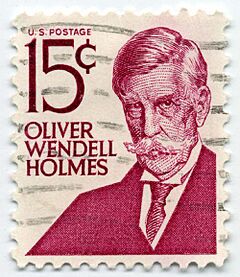
Holmes was widely admired in his later years. On his ninetieth birthday, he was honored on a national radio broadcast. The American Bar Association gave him a gold medal. Holmes served on the Court until January 12, 1932. At 90 years and 10 months old, he was the oldest justice to serve on the Supreme Court.
On his ninety-second birthday, President Franklin D. Roosevelt and his wife, Eleanor, visited him at his home. Holmes died of pneumonia in Washington, D.C., on March 6, 1935. He was almost 94 years old.
In his will, Holmes left most of his money to the United States government. He once said that "taxes are what we pay for civilized society." After he died, his personal items included his Civil War officer's uniform, still stained with blood and torn from bullets. He was buried next to his wife in Arlington National Cemetery.
The United States Postal Service honored Holmes with a 15¢ postage stamp. A statue of Justice Holmes was placed in the Hall of Fame for Great Americans in New York City in 1970.
Holmes's papers were given to Harvard Law School. For many years, they were kept private. This led to some imaginative stories about his life. A famous play and movie, The Magnificent Yankee, were based on his life. Eventually, Harvard Law Library made his papers available to scholars.
Congress created the U.S. Permanent Committee for the Oliver Wendell Holmes Devise using the money he left to the U.S. This money was used to create a memorial garden at the Supreme Court building. It also helps publish a series of books about the history of the Supreme Court.
Holmes's summer house in Beverly, Massachusetts, became a National Historic Landmark in 1972. This recognized his important contributions to American law.
Law Clerks
Oliver Wendell Holmes Jr. had many law clerks. These clerks often became close friends with each other. Many of them went on to have successful careers in law and government.
See also
- Demographics of the Supreme Court of the United States
- Freedom for the Thought That We Hate
- List of justices of the Supreme Court of the United States
- List of law clerks of the Supreme Court of the United States (Seat 2)
- List of United States Supreme Court justices by time in office
- Prediction theory of law
- List of people on the cover of Time Magazine: 1920s (March 15, 1926)
- Skepticism in law
- List of United States Supreme Court cases by the Fuller Court
- List of United States Supreme Court cases by the Hughes Court
- List of United States Supreme Court cases by the Taft Court
- List of United States Supreme Court cases by the White Court
 | Isaac Myers |
 | D. Hamilton Jackson |
 | A. Philip Randolph |


